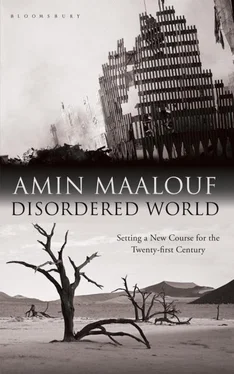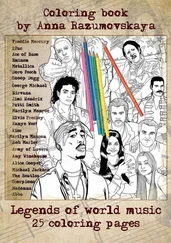In order to avoid misunderstanding, let me hasten to make clear that if, from my point of view, the solution does not lie in some outdated return to traditional morals or old forms of legitimacy, nor does it lie in moral relativism, which, in the name of a lazy, vulgar form of modernity, sanctifies supreme selfishness and worships all forms of negation. It wallows in an attitude of ‘every man for himself’ and ends up with the worst of precepts: ‘ Après moi, le déluge! ’ to which climate change could give a literal meaning.
Both these opposing attitudes lead by convergent paths to the same disorder. We need something quite different today. If we must leave old forms of legitimacy behind, it must be for better forms, not worse. A new scale of values needs to be worked out which will enable us to manage everything better than we have done in the past: our diversity, our environment, our resources, our knowledge, our tools, our power, our balances — in other words, our common future and our capacity for survival. What we do not need is a rejection of every scale of values.
‘Values’ is a word which is both versatile and debased. It navigates easily between the financial and spiritual spheres, and in the field of beliefs it can be a synonym for progress or conformism, for moral liberation or submission. And so I need to make clear the sense in which I am using it and the beliefs I attach to it, not in order to rally anyone at all to my standard — I do not have one and I keep my distance from parties, factions and cliques, since nothing is more precious to me than freedom of thought — but because it seems honest in setting out my vision to say unambiguously what I believe and how I would like things to end up.
From my point of view, leaving behind the disorder that affects the world for something better requires adopting a scale of values based on the primacy of culture. I would go so far as to say based on salvation through culture.
André Malraux has often had a quotation attributed to him which he probably never said: the twenty-first century ‘will be religious or it will not be at all’. I suppose that those final words — ‘or it will not be at all’ — mean that we will not be able to get our bearings in the maze of modern life without some spiritual compass.
This century is still young, but we already know that religion can lead humanity astray just as easily as its absence can.
That the absence of religion can cause suffering was amply demonstrated in Soviet society. But its abusive presence can also cause suffering; that much was clear in the time of Cicero, or of Averroes, Spinoza or Voltaire, and if the excesses of the French and Russian revolutions, Nazism and some secular tyrannies have tended to make us forget that fact in the last two centuries, there have been plenty of events since then to serve as a reminder. Events which, I hope, have given us a better appreciation of the role religion ought to play in our lives.
I am tempted to say the same thing about Mammon. Inveighing against material wealth and blaming those who strive to acquire it is a futile pursuit which has always served as a pretext for the worst sort of demagoguery. But making money the touchstone of all respectability, the basis for all power and all hierarchies, results in the social fabric unravelling.
Humanity has experienced so many contradictory trends in the space of two or three generations: communism/capitalism; atheism/religion. Should we resign ourselves to these pendulum swings and the disorder which results from them? Once bitten, should we not try to learn from our experiences and want in the end to escape these demoralising dilemmas?
It may seem a little too predictable for a writer, or indeed anyone in the cultural sphere, to advocate a scale of values based on culture. It may even provoke a smile. But that is because of a misunderstanding of the term.
The view of culture as just one field among many or a way of making life more pleasurable for a certain sort of person is a century or even a millennium out of date. Today the role of culture is nothing less than to provide us with the intellectual and moral tools for survival.
How are we to fill the extra decades that modern medicine has given us? More and more of us are living longer and better lives, but are inevitably prey to boredom, haunted by a sense of emptiness, and inevitably tempted to escape by indulging in an orgy of consumerism. If we do not want to exhaust the planet’s resources very quickly, we shall have to prioritise other forms of satisfaction as soon as possible, other sources of pleasure, in particular the acquisition of knowledge and the development of a flourishing inner life.
This is not a matter of imposing self-denial or becoming an ascetic. I for one am a fervent epicurean and prohibitions of any kind irritate me. We will continue very happily to use the fruits of the earth — and often to abuse them — and I will not be the one to cast the first stone. But if we want to benefit fully in the long term from what life can offer, we are going to have to alter our behaviour. Not to reduce our range of sensations, but on the contrary to enlarge and enhance it and to look for other satisfactions which may turn out to be yet more intense.
We already distinguish when it comes to energy sources between fossil fuels, which are finite and polluting, and renewable sources, such as solar, wind and geothermal, which are not. We could introduce a similar distinction when it comes to our lifestyles. We could seek to satisfy our needs and desires through consuming more, which would take its toll on the planet’s resources and cause destructive tensions. But equally, we could satisfy them in other ways, by giving priority to lifelong learning and by encouraging people to study languages, to become passionate about artistic disciplines, to become familiar with various sciences so that they are able to appreciate the significance of discoveries in biology or astrophysics. Knowledge is a universe without limits; all of us can draw upon it unrestrainedly throughout our lives and it will never run out. And even better, the more we draw on knowledge, the less we will deplete the planet.
This is already reason enough to consider the primacy of culture as a discipline for survival. But that is not the only reason. There is another, just as fundamental and which would in itself justify putting culture at the heart of our scale of values: it is the way in which it can help us handle human diversity.
Will people from diverse backgrounds who live side by side in the world’s cities and countries forever look at each other through the distorting lenses of received opinion, age-old prejudice and crude stereotypes? It strikes me that the time has come to change our habits and priorities, and to listen more seriously to the world we share — because there are no longer any strangers in this century; there are only travelling companions. Whether our fellow humans live across the street or on the other side of the world, they are only a short step away; our behaviour affects them intimately as their behaviour affects us.
If we wish to preserve peace in our societies, towns and neighbourhoods and all over the planet, if we want human diversity to translate into harmonious coexistence rather than tensions which breed violence, it is no longer enough to know others in an approximate, superficial, crude way. We need to know them subtly, up close; I would go as far as to say intimately. And that can only be achieved through their culture. The heart of a people is its literature. That is where it reveals its passions, aspirations, dreams, frustrations, beliefs, its vision of the world around, its perceptions of itself and others — including us. Because when we speak of others we must never lose sight of the fact that, whoever and wherever we may be, we are also ‘others’ for the rest of the world.
Читать дальше












